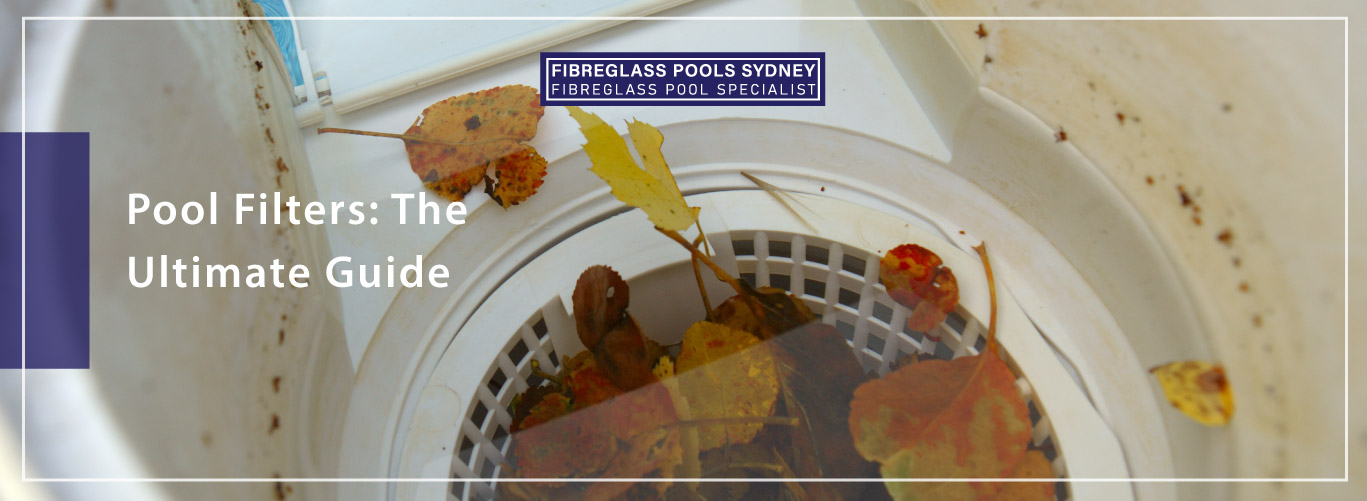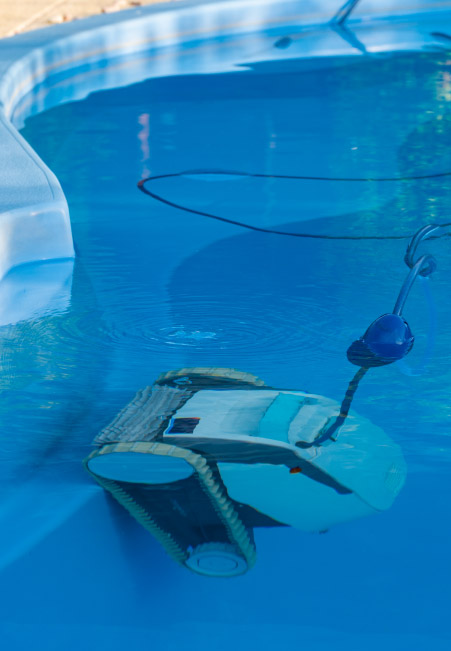Pool Filters: The Ultimate Guide
Welcome to the ultimate guide on pool filters—a crucial yet often overlooked component in maintaining the crystal-clear appearance of your swimming pool. This guide will navigate you through different types of filters, their functionality, and how to choose the best one for your specific pool needs. Equipped with this knowledge, you'll be better prepared to make an informed decision and ensure that your pool remains a clean and refreshing haven all year round.

What are the different types of pool filters?
There are primarily three types of pool filters—sand filters, cartridge filters, and diatomaceous earth (DE) filters. Each type has its strengths and weaknesses, so the right one for you depends on your specific pool needs and maintenance preferences.
Sand Filters
Sand filters are a popular choice for pool owners due to their simplicity and affordability. They work by filtering the pool water through a bed of special-grade sand, which traps dirt and debris. Over time, the accumulated dirt lowers the filter’s efficiency, requiring a process known as ‘backwashing’ to clean the filter. Although sand filters might not offer the finest filtration compared to cartridge and DE filters, they are robust and require less maintenance, making them an excellent option for large pools or pools located in areas with heavy debris. Keep in mind that the sand in the filter needs replacement every five to seven years for optimum performance.
Pros and Cons of Sand Filters
Pros
Simplicity: Sand filters are straightforward to use and understand, making them suitable for beginners.
Affordability: Compared to other types of filters, sand filters are economically priced.
Low Maintenance: These filters require less frequent cleaning as they can handle more substantial debris.
Durability: Thanks to their robust construction, sand filters are durable and able to withstand harsh weather conditions.
Cons
Filtration Quality: Sand filters are not as effective at filtering out smaller particles compared to DE or cartridge filters.
Backwashing: This process can be time-consuming and may require significant water usage.
Sand Replacement: The sand requires replacement every 5-7 years, which might be inconvenient for some pool owners.

Cartridge Filters
Cartridge filters are gaining popularity amongst pool owners due to their higher filtration efficiency and environmentally-friendly operation. These filters utilise a cartridge made from pleated polyester material to trap dirt and debris. The larger surface area of the cartridge allows it to capture more contaminants and extend the time between cleanings, making it an ideal choice for pools with a smaller volume of water or pools located in areas with less debris.
Unlike sand filters, cartridge filters don’t require backwashing. Instead, when the filter becomes dirty, you simply remove the cartridge and wash it off with a garden hose—a process that conserves water significantly. The cartridges require replacement every 3 to 5 years depending on usage, but they are generally more expensive to replace than sand.
Pros and Cons of Cartridge Filters
Pros
Filtration Quality: Cartridge filters offer superior filtration, effectively trapping smaller particles compared to sand filters.
Water Conservation: As these filters don’t require backwashing, they are a more eco-friendly option.
Extended Cleaning Interval: Due to the larger filtration area, cartridge filters require less frequent cleaning.
Cons
Price: Although they conserve water, cartridge filters are more expensive upfront and the replacement cartridges can also be costly.
Cleaning: Washing the cartridge can be more time-consuming than backwashing a sand filter.
Not Suitable for Large Pools: Due to their design, cartridge filters might not be the best option for larger pools or pools with heavy debris.
Diatomaceous Earth (DE) Filters
Diatomaceous Earth (DE) filters are regarded as the most efficient type of pool filter available on the market. They offer the highest level of filtration compared to sand and cartridge filters, capable of filtering out particles as small as 2 to 5 microns. This high filtration quality results in cleaner, clearer water for your pool.
Unlike the other filters, DE filters use a powdered form of fossilised remains of diatoms, a type of hard-shelled algae. This DE powder coats a series of fabric-covered grids within the filter and traps particles, including very small ones, as the pool water passes through.
Despite their superior filtration capabilities, DE filters do require more maintenance than sand or cartridge filters. They need to be backwashed and then ‘recharged’ with fresh DE powder. While this process can be more labour-intensive, the reward is exceptionally clear pool water.
Pros and Cons of Diatomaceous Earth Filters
Pros
Filtration Quality: DE filters offer the highest level of filtration, resulting in cleaner, clearer water.
Traps Small Particles: Capable of filtering out particles as small as 2 to 5 microns.
Cons
Maintenance: DE filters require more maintenance, including backwashing and recharging with DE powder.
Cost: DE filters are generally more expensive to purchase and maintain than other types of filters.
Environmental Concerns: Used DE powder can be hazardous, and disposal needs to be handled carefully to comply with environmental regulations.

Can I Install The Pool Filter Myself?
Yes, it is feasible for you to install a pool filter by yourself, but it requires careful planning and a good understanding of your pool system. It’s essential you choose the correct type of filter for your needs, be it a sand, cartridge, or DE filter, and you’ll also need to consider the size of your pool, its location, and how much debris it typically collects.
When installing a filter, make sure to read and follow the manufacturer’s instructions thoroughly. You should also have the appropriate tools on hand. Although it can be a DIY project, keep in mind that a professional installation will ensure that the filter is installed correctly and efficiently, potentially saving you time and avoiding any complications. Always remember that safety should be your priority in any DIY task, and if you’re unsure about any part of the installation process, it would be best to consult with a professional.
Conclusion
In conclusion, the type of pool filter you choose significantly impacts the cleanliness of your pool and the overall maintenance required. Sand filters, cartridge filters, and DE filters each have their unique advantages and drawbacks. Sand filters are budget-friendly and simple to operate, but their filtration efficiency doesn’t match up to that of cartridge or DE filters. Cartridge filters excel in water conservation and filtration quality, but they may be a bit pricier. Meanwhile, DE filters offer superior filtration quality but require a high level of maintenance and careful disposal of used DE powder. Ultimately, your choice should align with your pool needs, your budget, and your commitment to upkeep. As always, it’s vital to follow the manufacturer’s instructions for installation or seek professional help if needed. If you need help deciding, feel free to reach out to the team at Fibreglass Pools Sydney.
Pool Filters: The Ultimate Guide
Welcome to the ultimate guide on pool filters—a crucial yet often overlooked component in maintaining the crystal-clear appearance of your swimming pool. This guide will navigate you through different types of filters, their functionality, and how to choose the best one for your specific pool needs. Equipped with this knowledge, you'll be better prepared to make an informed decision and ensure that your pool remains a clean and refreshing haven all year round.

What are the different types of pool filters?
There are primarily three types of pool filters—sand filters, cartridge filters, and diatomaceous earth (DE) filters. Each type has its strengths and weaknesses, so the right one for you depends on your specific pool needs and maintenance preferences.
Sand Filters
Sand filters are a popular choice for pool owners due to their simplicity and affordability. They work by filtering the pool water through a bed of special-grade sand, which traps dirt and debris. Over time, the accumulated dirt lowers the filter’s efficiency, requiring a process known as ‘backwashing’ to clean the filter. Although sand filters might not offer the finest filtration compared to cartridge and DE filters, they are robust and require less maintenance, making them an excellent option for large pools or pools located in areas with heavy debris. Keep in mind that the sand in the filter needs replacement every five to seven years for optimum performance.
Pros and Cons of Sand Filters
Pros
Simplicity: Sand filters are straightforward to use and understand, making them suitable for beginners.
Affordability: Compared to other types of filters, sand filters are economically priced.
Low Maintenance: These filters require less frequent cleaning as they can handle more substantial debris.
Durability: Thanks to their robust construction, sand filters are durable and able to withstand harsh weather conditions.
Cons
Filtration Quality: Sand filters are not as effective at filtering out smaller particles compared to DE or cartridge filters.
Backwashing: This process can be time-consuming and may require significant water usage.
Sand Replacement: The sand requires replacement every 5-7 years, which might be inconvenient for some pool owners.

Cartridge Filters
Cartridge filters are gaining popularity amongst pool owners due to their higher filtration efficiency and environmentally-friendly operation. These filters utilise a cartridge made from pleated polyester material to trap dirt and debris. The larger surface area of the cartridge allows it to capture more contaminants and extend the time between cleanings, making it an ideal choice for pools with a smaller volume of water or pools located in areas with less debris.
Unlike sand filters, cartridge filters don’t require backwashing. Instead, when the filter becomes dirty, you simply remove the cartridge and wash it off with a garden hose—a process that conserves water significantly. The cartridges require replacement every 3 to 5 years depending on usage, but they are generally more expensive to replace than sand.
Pros and Cons of Cartridge Filters
Pros
Filtration Quality: Cartridge filters offer superior filtration, effectively trapping smaller particles compared to sand filters.
Water Conservation: As these filters don’t require backwashing, they are a more eco-friendly option.
Extended Cleaning Interval: Due to the larger filtration area, cartridge filters require less frequent cleaning.
Cons
Price: Although they conserve water, cartridge filters are more expensive upfront and the replacement cartridges can also be costly.
Cleaning: Washing the cartridge can be more time-consuming than backwashing a sand filter.
Not Suitable for Large Pools: Due to their design, cartridge filters might not be the best option for larger pools or pools with heavy debris.
Diatomaceous Earth (DE) Filters
Diatomaceous Earth (DE) filters are regarded as the most efficient type of pool filter available on the market. They offer the highest level of filtration compared to sand and cartridge filters, capable of filtering out particles as small as 2 to 5 microns. This high filtration quality results in cleaner, clearer water for your pool.
Unlike the other filters, DE filters use a powdered form of fossilised remains of diatoms, a type of hard-shelled algae. This DE powder coats a series of fabric-covered grids within the filter and traps particles, including very small ones, as the pool water passes through.
Despite their superior filtration capabilities, DE filters do require more maintenance than sand or cartridge filters. They need to be backwashed and then ‘recharged’ with fresh DE powder. While this process can be more labour-intensive, the reward is exceptionally clear pool water.
Pros and Cons of Diatomaceous Earth Filters
Pros
Filtration Quality: DE filters offer the highest level of filtration, resulting in cleaner, clearer water.
Traps Small Particles: Capable of filtering out particles as small as 2 to 5 microns.
Cons
Maintenance: DE filters require more maintenance, including backwashing and recharging with DE powder.
Cost: DE filters are generally more expensive to purchase and maintain than other types of filters.
Environmental Concerns: Used DE powder can be hazardous, and disposal needs to be handled carefully to comply with environmental regulations.

Can I Install The Pool Filter Myself?
Yes, it is feasible for you to install a pool filter by yourself, but it requires careful planning and a good understanding of your pool system. It’s essential you choose the correct type of filter for your needs, be it a sand, cartridge, or DE filter, and you’ll also need to consider the size of your pool, its location, and how much debris it typically collects.
When installing a filter, make sure to read and follow the manufacturer’s instructions thoroughly. You should also have the appropriate tools on hand. Although it can be a DIY project, keep in mind that a professional installation will ensure that the filter is installed correctly and efficiently, potentially saving you time and avoiding any complications. Always remember that safety should be your priority in any DIY task, and if you’re unsure about any part of the installation process, it would be best to consult with a professional.
Conclusion
In conclusion, the type of pool filter you choose significantly impacts the cleanliness of your pool and the overall maintenance required. Sand filters, cartridge filters, and DE filters each have their unique advantages and drawbacks. Sand filters are budget-friendly and simple to operate, but their filtration efficiency doesn’t match up to that of cartridge or DE filters. Cartridge filters excel in water conservation and filtration quality, but they may be a bit pricier. Meanwhile, DE filters offer superior filtration quality but require a high level of maintenance and careful disposal of used DE powder. Ultimately, your choice should align with your pool needs, your budget, and your commitment to upkeep. As always, it’s vital to follow the manufacturer’s instructions for installation or seek professional help if needed. If you need help deciding, feel free to reach out to the team at Fibreglass Pools Sydney.


